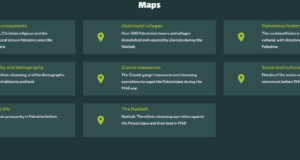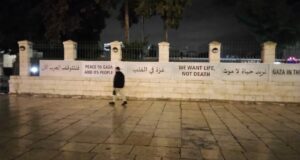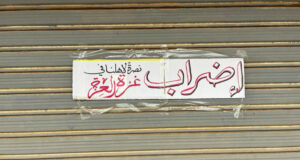By Nat
After tea at Abu Fadi’s house, we went to Abu Kamel’s house to have breakfast (there was some competition between these two cousins as to whose house we were to have breakfast at), we had a tour of Salim: the water tower that had been ransacked, the house that had been occupied, the olive trees that had been cut down because they were next to the settler bypass road, and the bypass road which the villagers were not allowed to cross but which divided them from their olive trees and surrounding villages. We had a nice long chat with the IDF soldiers in an APC about the occupation, and we had one Salim resident who spoke good English talk with them as well. The soldiers justified their presence there because of the suicide bombing. They said they didn’t think the bombing would subside or stop if they left the West Bank and Gaza, but they also recognized that being there just created more anger and suicide bombers.
They basically didn’t have much hope for peace. One of them, in a side conversation with Mika (who has been here 3 times and is very good at talking with them) said that if he were Palestinian he’d probably be a suicide bomber and resist the occupation with arms. When we were finishing our conversation, some Palestinians approached us from Salim and wanted to pass, and the soldiers let them pass because they had a doctor’s note (which was forged), and they could get close enough to the soldiers to give them the note because we were there. One of them was pregnant. We then went to the clinic in Salim to investigate a hepatitis A & B outbreak. They said they needed hep vaccines from the Palestinian Authority Ministry of Health in Nablus. The doctor there (Dr. Ibrahim Mubarek) said that more than 20 people with hep had come to the center, and that more had gone to Nablus or don’t know that they have the disease. He said it was caused by pollution, lack of garbage disposal. Hep A is treated in the center, Hep B has to go to the hospital in Nablus.
The outbreak is also in neighboring villages (Beit Fareek and Beit Dajar) which both have clinics of their own. They need special medical personal from the Ministry of Health to administer the vaccines. After phoning the UPMRC with this information, we heard back that the vaccines are being held up because of politics and funding from Israel (West Bank taxes have been withheld by Israel during the Intifada). At the clinic we also met a man whose son had a head injury because of an Apache helicopter attack a few months ago and who had shrapnel in his arm and needed to go to the hospital in Nablus. Another man said he had to go to a hospital in Tel Aviv to have his broken leg checked out (he apparently broke it in Tel Aviv). He wanted us to go to the Hawara military base to help him get permission to go to Tel Aviv. We then went to the UPMRC center in Nablus (United Palestinian Medical Relief Committee) and from there headed out to a house occupied by the IDF near the Rujeib village. This was the first time in the 21 days of occupation that they had had visitors.
The 4 of us came with a doctor from the UPMRC and brought medicine and food and other supplies. When we arrived we negotiated with the soldier to allow all of us up to see the family, and then we heard their story (over coffee of course): ‘Occupied for 21 days. When the soldiers came, they took all the keys. There are 5 families with 15 adults, 30 children, 1 old sick man (who the doctor checked out – he has bronchial asthma). The kids get 30 minutes outside in a patio with guns pointed at them. Nobody else is allowed out except to get groceries every so often (the last time they had been out was 12 days ago). Telephones and electricity were turned off. They occupy half of their house, the soldiers the other half. The soldiers attempted to occupy more space but the family stopped them in some way from doing this. They are farmers and rely on their crops for their livelihood, and according to them all their crops were lost because of lack of watering. They also lost a donkey.
The kids have allergy from the dust created by the soldiers (it’s a training camp for the soldiers and they shoot their guns and otherwise make lots of noise at night). At one point the soldiers took one of the men of the house (Hamud Ali Absun Salan) to another village to be a human shield while the soldiers arrested someone there. The soldiers attempted to take the man’s child as well but the mother successfully resisted. They appeal to the international community to get the soldiers out and expose their story. They are innocent people, none of them are wanted in connection to the Intifada (they are not a family of a suicide bomber), and they want peace and justice for themselves and for Palestine.
They are in area C (according to the Oslo agreements) and are therefore worried that their homes will be taken or demolished in a final peace settlement with Israel. One woman (Maisud) is a student and needs to take her exam in accounting Saturday at the Nablus university (in 4 days). They need more medicine and supplies. It was very hard to leave because we saw how much they appreciated us being there. One of our groups did magic tricks for the kids and made balloon shapes for them, which was a huge hit. The senior man took me aside and pointed to his field, saying “all lost.” When we left, we spoke to one of the soldiers and appealed to him to let the people out and water their crops. He claimed that they were allowed out every day and that the soldiers were giving them whatever they needed. The crops looked shriveled and dead to us. Next we went to another house in Msaken Shabiya where 20 internationals held a vigil and some of us then prepared to sleep next to the house. The commander came out and said that we had to leave and in 15 minutes he would “use power.” 15 minutes later he came out and asked if we could make a deal: if he let the family go out X more hours a day, would we leave. We said 2 more hours, and after he agreed and after we talked with the family to make the situation clear to them, we left.
Wednesday July 31:
We went back to Salim to remove the road block, which went well and we made a road around the 5 foot ditch dug by the bulldozer the night before. It was mostly internationals digging, but we had spades and pick axes this time. Some people stayed behind to make sure the bulldozers didn’t come again. I and 3 others went to the occupied house in Msaken Shabiya to see if the soldiers kept their promise to let the family out twice a day for two hours instead of one. There was a rumor that the soldiers had left altogether, and when we arrived we found this to be true! The family was cleaning up where the soldiers had been, and we got a tour of all the damage the soldiers had done during their 21 day stay: 2 stereos damaged, 1 VCR, holes in the walls, curtains and towels and clothes taken and used to oil the guns of the soldiers, broken drawers, fridge, oven, writing and dirt on the walls, the bed damaged from soldiers jumping in it during the night when they blasted music. TV remote gone. Window screens, 2 fans, and much more damage.
After leaving the family (and the obligatory coffee, tea, soda) we went to Husein’s house in the old city (Nablus) and slept. We then got reports that tanks and bulldozers were heading towards the Salim road block so we headed out to the road block but then heard reports that tanks were invading the old city and came back with all the other internationals. By the time we got back they had left, but we walked around the city to see if they would return. At night the teenagers came out and hassled the women in our group – it’s the time when I’ve seen the ugliest part of Palestinian society – at all other times it is so beautiful and loving. We then went back to our own houses and slept.
Thursday Aug 1:
Woke up in the old city for a planned 9:30am media story on the ISM by a Danish TV group. When they arrived, we got reports that the Balata refugee camp was being invaded by tanks and jeeps. The media crew agreed to follow us there after conducting a short interview with one of us. We headed out, 7 in a taxi, to meet the other internationals staying in Balata camp with families of suicide bombers (these families are often targeted with collective punishment, and their homes are often demolished). When we got to the camp we could smell tear gas and we went into an alley to escape it and also to see kids throwing stones at a tank.
Then we went to the Titi house (where some of the internationals were staying) to group and decide what to do. From there we saw an army jeep hurl tear gas. They retreated and we went outside to where two tanks were in an agricultural field on the edge of the camp. For about an hour the kids hurled stones at the tank and the tank would advance and retreat, firing M16 bullets into the air or the ground which would chase the kids back. We made sure to make our presence known (about 13 of us) and then tried to get away from the kids but still be in a position to witness the situation. An ABC TV camera man showed up and then some of us went to get water and food. When we were away, one of the tanks fired a bullet just above the crowd of internationals and Palestinians, and the ricochet hit a Palestinian in the head. I saw the car speed off with him as we were eating hummus and pita. At that point the tanks retreated and left the camp, and we went back to the Titi house where I took a nap.
After about 2 hours 3 tanks came back and drove on the road outside the camp where they again fired into the ground while kids threw stones at the tanks. Seeing the kids throw stones, I immediately thought about what would happen if the kids sat down in front of the tanks to stop them from entering the city. Maybe they would be fired upon (no different than now), but it would change the dynamics of the conflict immensely. This possibility doesn’t even seem in the realm of possibility based on what I have heard Palestinians say about the conflict: “they are defending their city; it’s an exciting and righteous game for the kids; being passive is giving up their city; they have successfully defended their camp with stones in the past; stones are all they have.”
 International Solidarity Movement Nonviolence. Justice. Freedom.
International Solidarity Movement Nonviolence. Justice. Freedom.


